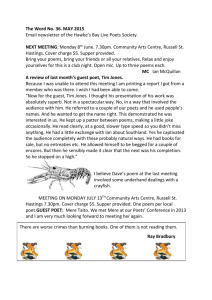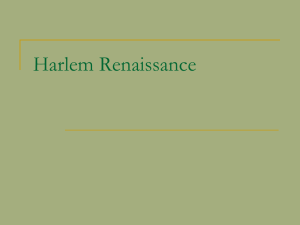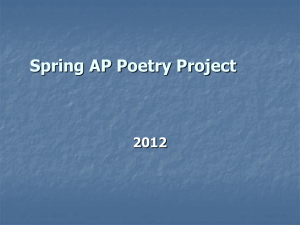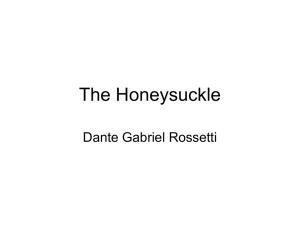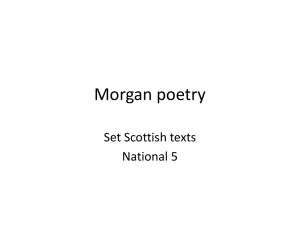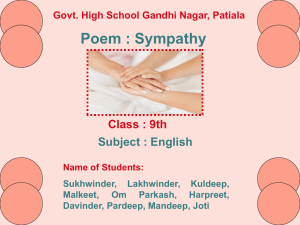Text Analysis: Poetry Oral - Laura Sklaptis ePortfolio
advertisement
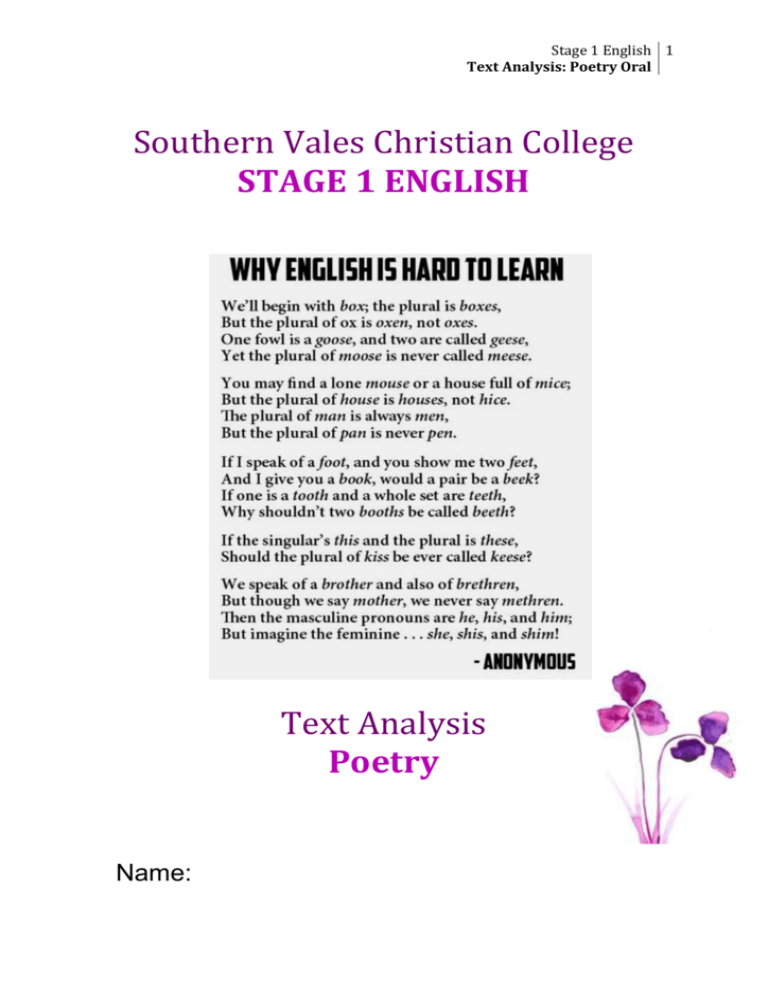
Stage 1 English 1 Text Analysis: Poetry Oral Southern Vales Christian College STAGE 1 ENGLISH Text Analysis Poetry Name: Text Analysis – Poetry Oral - Knowledge and Understanding Analysis Application Communication A KU3: Comprehensive knowledge and understanding of the ways in which familiar and unfamiliar texts are composed for a range of purposes and audiences. An1: Analysis of complex connections between personal experiences, ideas, values, and beliefs, and those explored in familiar and unfamiliar texts. Ap2: Detailed and appropriate use of evidence from texts to support conclusions, with textual references incorporated fluently in responses. C1: Fluent and precise writing and speaking. B KU3:Knowledge and understanding of the ways in which mainly familiar texts are composed for some purposes and audiences. An1: Analysis of some complex connections between personal experiences, ideas, values, and beliefs, and those explored in familiar, and some unfamiliar, texts. Ap2: Use of evidence from texts to support conclusions, with textual references incorporated in responses. C1: Mostly fluent and precise writing and speaking. C KU3: Knowledge and understanding of the ways in which familiar texts are composed for familiar purposes and audiences (e.g. identifies purpose and audience of texts). An1: Analysis of simple connections between personal experiences, ideas, values, and beliefs, and those explored in familiar texts (e.g. explicitly connects new ideas/information with own knowledge, using techniques such as anecdotes and analogies). Ap2: Competent use of evidence from texts to support conclusions (e.g. reads short, simple narrative of choice and discusses how text reflects author’s opinion). C1: Generally fluent and functional writing and speaking. D KU3: Knowledge of the ways in which familiar texts are composed for personally relevant purposes and familiar audiences. An1: Reference to simple connections between uncomplicated personal experiences, ideas, values, and beliefs, and those explored in familiar texts. Ap2: Some use of evidence from familiar texts to support conclusions. C1: A level of fluency in writing and speaking in personally relevant situations. E KU3: Knowledge of the ways in which highly familiar texts are composed for personally relevant purposes and highly familiar audiences. An1: Recognition of a simple connection between a straightforward personal experience, idea, value, or belief, and that explored in a highly familiar text. Ap2: Some use of evidence from highly familiar texts to support a simple conclusion. C1: Beginning of development of fluent writing and speaking in personally relevant situations. Overall Grade: A B C D . E Grade: /20 Stage 1 English 3 Text Analysis: Poetry Purpose: Analysis of Poems: Over the course of the next few weeks, we will be spending time deconstructing and analysing a selection of Bruce Dawe’s poems as a class; looking at themes and techniques he uses. Using the knowledge gained from poems studied in class, you will choose one poet and at least 4 poems from that poet to analyse individually, exploring the use of poetic techniques and conventions used to make meaning. You will explore your respective poet’s world and provide a biography of their work and world as well as commenting on the personal connection between you and their poems. Poetry Oral: After analysing 4 poems written by your chosen poet, you are required to present a 4-6 minute oral. Make sure you have chosen poems you UNDERSTAND and can IDENTIFY with. You will be assessed according to the criteria below: Analysis of poems: 10 marks Personal connection to poem/s: 5 marks Competence in oral mode: 5 marks (Volume, clarity, variety of tone, pace, eye contact, body language) Description of Task Analysis of poems Choose one poet and analyse at least 4 of their poems (suggestions on page 5) For the poet and each selected poem, the following is expected: 1. An overview of the poet and their respective world. This is not expected to just be a download from the Internet; a little research would be great. An appreciation of a poet’s world will enhance your understanding of ‘where they were coming from’ and what message they were perhaps trying to get across. From reading widely about the poet and reading some of their poetry, you should be able to incorporate the titles of some poems and how these poems are reflective of their world. 2. Deconstruction and analysis of each poem. It is expected that you will annotate each poem and then produce a detailed minimum one paragraph response to the content, ideas and poetic techniques utilised by the poet. The one to two paragraphs should provide the following information: What is the poem about? (2-3 sentences) What messages/ ideas are reflected in the poem? (You should find at least 2-3) What techniques have been effectively utilised in order to explore these ideas? Remember our magic 3: Technique, Example, Reflection (TER) The following poetic techniques should be mentioned in your analysis: Onomatopoeia Imagery Similes Symbolism Metaphors Personification Alliteration Structure Assonance Form (ballad/free Oxymoron verse/ blank verse/ Rhyme sonnet/ ode/ dramatic Rhythm monologue/ villanelle) Repetition In essence, the more detail you provide, the better the overall quality of the final product. 3. As a final summary, you are asked to make complex connections between personal experiences, ideas, values and beliefs, and those explored (A grade performance standard) in the poetry you have studied. What impact has the poetry you have studied made on you and your world? What new understanding do you now have about poetry and the way it is crafted? Does your poet have any relevance to today’s society? Stage 1 English 5 Text Analysis: Poetry POETRY STUDY: POETS AND POEMS WOMEN (wives/mothers/individuals) Gwen Hardwood (Australia): Suburban Sonnet/ Suburban Sonnet Boxing Day/ Mother Who Gave Me Life/ Dialogue/ In the Park Sylvia Plath (America): Morning Song/ Lady Lazarus/ The Applicant / Tulips/ Pain for a Daughter Judith Wright (Australia) Grace Nichols (Guyana/ England) Jennifer Strauss Jeri Kroll (America/ Australia) Anne Sexton (America): Unknown Girl in a Maternity Ward/ For My Lover, Returning to His Wife/ The Rival Adrienne Rich (America) DEATH W H Auden: Stop all the Clocks Emily Dickinson: I Felt a Funeral in my Brain/ Because I Could Not Stop for Death Robert Frost: Stopping by Woods on a Snowy Evening/ Nothing Gold Can Stay/ Out, Out/ Fire and Ice Sylvia Plath: Edge/ Lady Lazarus Dylan Thomas: Do Not Go Gentle/ And Death Shall Have No Dominion Seamus Heaney: Limbo/ Casualty Bruce Dawe: Katrina LIFE ISSUES/ LIFE CYCLE William Blake Bruce Dawe: Life-Cycle Robert Frost: The Road Not Taken/ Birches Seamus Heaney: Mid-Term Break W.B. Yeats Jeri Kroll John Keats Anne Sexton T S Elliott INDIGENOUS VOICE Hyllus Noel Maris: Spiritual Song of the Aborigine Kevin Gilbert: The Tribal Ghost Kev Carmody: Travellin’ North/ Moonstruck Coralie Cassady: No Disgrace WAR Bruce Dawe (Vietnam): Homecoming/ Weapons Training/ Vietnam Postscript 1975 Seamus Heaney (Ireland: IRA): Casualty Wilfred Owen (WW1): Anthem for Doomed Youth/ Futility/ Strange Meeting/ Dulce et Decorum Est Kenneth Slessor (WW2): Beach Burial Siegfried Sassoon (WW1): Suicide in the Trenches/ Does it Matter/ The Hero/ Memory David Campbell (WW2): Men in Green Vernon Scannell (WW2): Mental Ward/ Bayonet Training Rupert Brooke (WW1): The Soldier/ Funeral of Youth LOVE/RELATIONSHIPS W H Auden: A Song of Despair / Funeral Blues Bobbi Skyes John Donne: The Sunne Rising Sylvia Plath: Tulips Andrew Marvell: To His Coy Mistress William Shakespeare: Let Me Not to the Marriage of True Mindes/ My Mistress’ Eyes are Nothing Like the Sun William Blake: The Sick Rose/ The Clod and the Pebble Bruce Dawe: By as little as a look/ The Turnstiles/ Definition of Loving/ Then/ Suburban Lovers Anne Sexton: Killing the Love/ For my Lover/ Returning to his Wife Gwen Harwood: Suburban Sonnet: Boxing Day Pablo Neruda (Chile): Tonight I Can Write the Saddest Lines/ If You Forget Me/ Tonight I can write/ Absence Thomas Hardy: Ten Years Since Maya Angelou: Poor Girl/ Prescience Oscar Wilde: Her Voice/ Silentium Amoris/ Helas NATURE William Blake John Donne G M Hopkins: The Kingfisher/ God’s Grandeur John Keats: Ode to a Nightingale W.B. Yeats Oral Presentation on a chosen poet In class we have been looking at different poets, analysing their poetry and discussing the impact of the devices used on the reader. We annotated poetic texts as part of this process. This forms the necessary background to assist in your own analysis of a chosen poet’s texts. You need to select four poems form this author. 1. You will need to select a poet from the list provided on page 5 and present an analysis of this poet’s work. In addition, you will need to outline the context of the poet (what was happening in the world at the time that this poet wrote their poems). 2. What was the poet’s purpose in writing? 3. Select 4 poems from this poet for analysis 4. You will need to annotate each poem and submit these as evidence for your speech. 5. Identify the devices used in the poem and comment upon their impact (TER: What technique has been used, find an example, what is the effect on the reader?) 6. Finally, what personal connection do you have with this poem? What ideas, values or beliefs link to your own? This is an important criteria in this task – do not omit it from your presentation. 7. Consider your audience – make sure you have a copy of the poem on a slide for them to look at. Be prepared to spread the text across several slides if needed. Too much written text on a slide is off putting for the audience. 8. Commit part of a poem to memory. Are you going to recite on full poem or sections from the 4 poems studied? 9. Rehearse, rehearse, rehearse!!!! You need to connect with your audience and this is difficult to do if you are reading from your notes for the duration of this presentation. Eye contact is important!! PowerPoint slides should assist in the delivery of this speech. Speech length: 4-6 minutes. Due Date ________________________ Week _______ Stage 1 English 7 Text Analysis: Poetry Exceptional Oral Presentations Or, how to “talk good” Don’t spend much time talking about your poet and his world – this is worth the least amount of marks. Only give a brief overview. Most of the marks will be rewarded to students who have analysed and understood their poems well and identified their personal connection clearly. Again, make sure you know your poems well. This means that you have to practice through your entire presentation a number of times before you actually present it. You may use notes when you are presenting, but try to cut them down to dot-points on cue cards to avoid simply reading out your speech to the class. When you are presenting, you need to speak slowly, clearly and concisely. Most of the time, when speaking in front of people, you will think that you are speaking more slowly than you really are. This is especially true if you are nervous. Remember: even if you’re not confident, pretending that you are will get you through 6 minutes speaking to your friends and teacher! Pace your presentation well, keeping in mind that you must say enough of substance to get a good grade, but slowly enough that your audience can understand you. This IS possible to do in 6 minutes!


